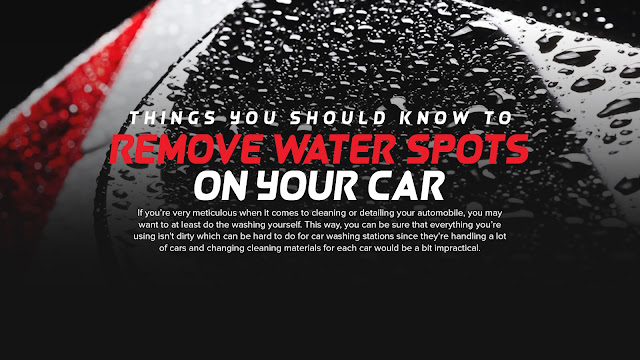Swirl marks and scratches are the results of improper methods of removing water stain. While swirl marks happen during cleaning and detailing, it’s actually the products and tools used that does the damage. For example, using dirty wash mitts or sponge is one culprit since even the tiniest dirt trapped in those can cause fine scratches. Another reason behind swirl marks are dirty wax or polish applicator or dirty microfiber cloth.
If you’re very meticulous when it comes to cleaning or detailing your automobile, you may want to at least do the washing yourself. This way, you can be sure that everything you’re using isn't dirty which can be hard to do for car washing stations since they’re handling a lot of cars and changing cleaning materials for each car would be a bit impractical.
Another cause would be removing missed patches with a drying cloth. It happens to the best of us: you rinse your car, only to find you’ve missed a bit. But, instead of reaching for the cleaning cloth (the recommended solution), you attack the spot with your drying cloth – a big no-no. By rubbing a mucky mark with a dry cloth, you’ll effectively work the dirt into the paint, or at the very least cause a stubborn swirl mark. Remember – never clean your car with a dry cloth.
Now, if you’re still getting those swirl marks even when you’ve made sure the cleaning cloths and applicators are clean, the problem could be your car’s surface itself. If your paintwork has embedded contaminants, polishing the surface and waxing it will only drag those harmful particles round and round, thereby creating those nasty swirls. This is where prepping your paintwork prior to waxing and polishing becomes very crucial. Start by running your fingers along the body of the car, if it’s smooth all throughout then you’re good to go. If not, grab a clay bar and special lubricant and then move the bar in a back-and-forth motion (without exerting pressure) to remove embedded particles. When the clay gets dirty, you fold it to reveal the clean surface and continue. After your vehicle is done, the paintwork should feel as smooth as glass.
Causes Of Water Stains
· Mineral And Dirt Deposits
Mineral and dirt deposits comprise the first category of water stains. These are mostly a result of trace minerals present in rain, sprinkler systems or in the car cleaning water, which remains on your vehicle exterior surface when it is washed but not dried off.
· Corrosive Liquids
This type of water stains refers to etchings or craters that appear in the paint due to some corrosive liquids such as air con water discharge coming in contact with the car surface, which can lead to deterioration of the car paint and even the lacquer.
Ways To Remove Water Stain Properly
· Wash It Thoroughly
People don’t just seek car servicing in Singapore due to engine problems, more often than not it’s due to exterior damage or imperfections like swirl marks from different kinds of dirt like grease, grime, bird poop and water. When left unattended for an extended period of time, they can cause serious paint damage on your car. Avoid the stress and unnecessary expenses by keeping your vehicle clean.
Polishing is one of the most misunderstood paint care procedures and as a result many individuals skip this important step. Polish is an abrasive compound, which, when worked into the paint using the hand or a polisher, shaves off imperfections of the paint. It levels out the surface and makes it smooth, thereby preparing it for the next step of applying wax or paint sealant. If you wax without polishing the surface first, not only will the paint look dull, but you will also notice that the wax layer will wear off quicker than usual. So ultimately it is a huge waste of your time and resources. Because polish is abrasive as mentioned above, it is important to master polishing techniques especially if you are using a rotary buffer, or you risk burning right through the paint.
· Apply Wax
Once you’ve polished all the areas you need to and you’re happy that you’ve removed all the polish, you can wax your car. This will protect the paintwork against water stain and future damage and give you a beautiful shiny finish which can last up to 12 months. It takes time to apply as you need to apply in small amounts and buff but your patience will be rewarded with a brand new and shiny looking car.
· Vinegar
White vinegar is a mild acid, and the minerals and pollutants in water spots can be broken down by this mild acid. To apply, simply follow these steps:
1. Mix white vinegar and distilled water in equal parts in a bucket.
2. Soak a sponge or a microfiber cloth in the solution.
3. Apply the solution to the water spots, allowing the solution to soak into the stains for about a minute or two. The key is to allow the vinegar to break down and loosen the contaminants’ grip on the surface so they can be wiped off gently.
4. After the waiting period, try to gently wipe off the spot. Avoid the tendency to wipe vigorously as you will be merely grinding the minerals and the pollutants onto the paint finish, creating scratches.
· Clay Bar
Detailing clay is a synthetic resin compound designed to pick up minerals and pollutants on your car’s finish as you glide it on a car’s well-lubricated paint finish. Use this if white vinegar wasn’t enough to get rid of the stains. Check out the following instructions:
1. Get some detailing clay and clay lubricant.
2. Spray lubricant onto the paint finish.
3. Glide the clay over the lubricated surface gently, with light pressure. It may take several passes to remove the water spots.

